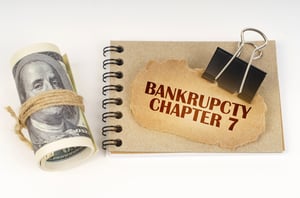 A chapter 7 bankruptcy is a great and powerful tool that allows people to get rid of huge amounts of debts that they can no longer financially afford to pay. Unlike, in a chapter 13, in which a person pays as much as they can towards their debts in a 3 to 5 year repayment before receiving a discharge of their remaining debts, a person in a chapter 7 bankruptcy case is not required to make payments towards their debts, and typically receives a discharge within 3 to 4 months after filing their case. Any person is allowed to file for chapter 7 bankruptcy so long as they qualify based on their income (the person must have an income that is below the State median income for their family size).
A chapter 7 bankruptcy is a great and powerful tool that allows people to get rid of huge amounts of debts that they can no longer financially afford to pay. Unlike, in a chapter 13, in which a person pays as much as they can towards their debts in a 3 to 5 year repayment before receiving a discharge of their remaining debts, a person in a chapter 7 bankruptcy case is not required to make payments towards their debts, and typically receives a discharge within 3 to 4 months after filing their case. Any person is allowed to file for chapter 7 bankruptcy so long as they qualify based on their income (the person must have an income that is below the State median income for their family size).
There is a tradeoff for a person’s right to get rid of their debt without having to make any payments, however. The tradeoff is that the chapter 7 trustee has the right to take some of a person’s property to pay creditors if it is not “exempt,” meaning legally protected from creditors. In the majority of chapter 7 cases, most, if not all, of a person’s property is exempt and there is little-to-nothing for the trustee to take to pay creditors. Minnesotans who file a chapter 7 bankruptcy case have the option of choosing whether to use the exemptions provided by the Federal Bankruptcy Code or Minnesota exemptions (which also includes other Federal exemptions not included in the Bankruptcy Code) to protect their property from creditors. Regardless of which exemptions they choose, the law is very generous at allowing people who file for bankruptcy (i.e. the “debtor”) to keep most of their basic property. Both State and Federal Exemptions allow the debtor to keep basic property such as a home, a reasonably-priced car, and other necessities such as clothing and most household goods, for example. However, in some circumstances, when the debtor has extra unnecessary property, such as an ATV, a second vehicle, or an excessive tax refund or amount of money in the bank, such property will not be legally exempt, and the trustee has the right to take the property to be “liquidated” to pay creditors. Liquidating this nonexempt property means taking it and selling it, typically at an auction, to convert it into cash (if not already in the form of cash) to pay creditors.
When the debtor files their bankruptcy case, all of their property, with very limited exceptions, becomes property of the “bankruptcy estate.” Technically, under bankruptcy law, the trustee controls all of the Debtor’s property in the bankruptcy estate. As discussed, the trustee is required to liquidate all of the Debtor’s nonexempt property to pay creditors, but must allow the Debtor to retain possession of their exempt property. The good thing in bankruptcy is that the trustee will typically allow the debtor to keep most, if not all, of their nonexempt property by having the Debtor pay the value of the nonexempt property. In most cases, the trustee will even allow the Debtor to make monthly payments to keep the property, although trustees typically only allow this payment period to last for a short time (usually not more than 6 to 8 months). The important thing to remember is that, regardless of whether the Debtor ultimately surrenders their nonexempt property to the trustee or pays the trustee to keep the nonexempt property, the tradeoff is almost always well in the Debtor’s favor. This is because the value of the nonexempt property is almost always significantly lower than the amount of debt that is discharged in the bankruptcy.
CALL NOW FOR A FREE STRATEGY SESSION FROM A MN BANKRUPTCY LAWYER AT LIFEBACK LAW FIRM
A person considering filing for bankruptcy in Saint Paul, Minnesota, the Twin Cities Metro area, or greater Minnesota, should first consult with an experienced bankruptcy attorney to ensure their property if best protected from creditors during their bankruptcy. Visit us at Lifebacklaw.com or in-person at our new St. Paul office, located at 370 Selby Ave Suite 224, St Paul, MN 55102!


